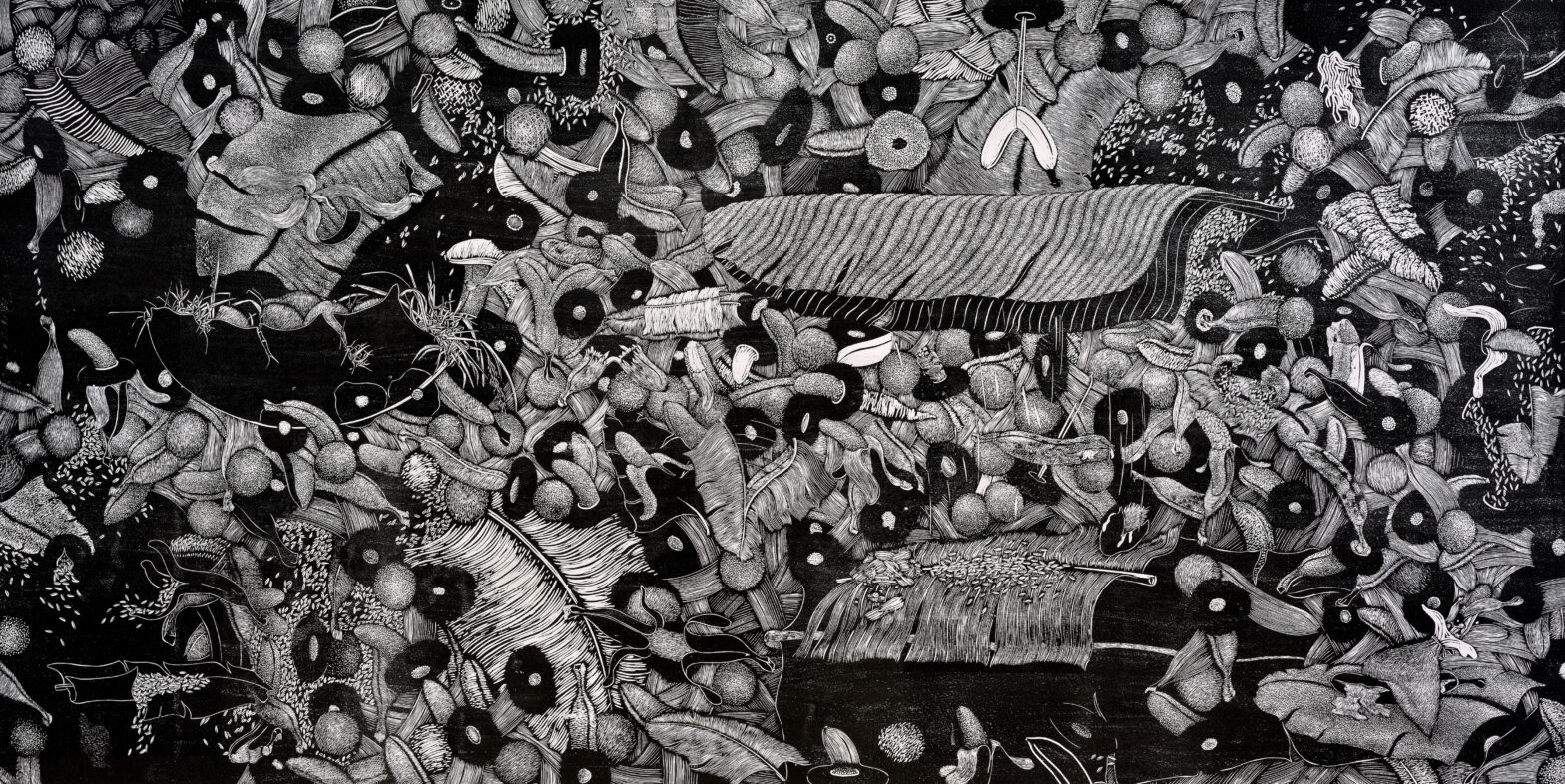Which Sky Do Birds Fly
Aug 25, 2023 - Oct 15, 2023
- SELECTED WORKS
- CURATORIAL NOTE
- DOWNLOAD CATALOGUE

Which Sky Do Birds Fly
Co-curated by: Saloni and Manan Shah
From time immemorial, place-making has been acted out as an evolutionary practice especially by us in our ecosystem through a feeling of affinity or attachment to a place which leads to building of communities, as we start finding points of connection. The psychological drive to feel this subjective experience/ entity has been coined over the centuries as Belonging or Belongingness. Within this urge to belong there develops the ‘right to feel at home’ at a specific location, which gives birth to the politics of space and access to it and question, ‘who belongs more?’ as the historical past is filled with narratives of colonisation and contestation over lands and space whether territorial, ecological or of natural resources.
The exhibition calls attention to changing definitions of belonging in contemporary culture and thereby the politics of space with the backdrop of ever-present contestation of lands. Working from different vantage points, the artists represent alternative histories that inform our current sense of belonging, the contestations over space, bodies and territoriality, interrogating and resisting the hegemonic narratives that become the mediatized source of knowledge for the individual.
CURATORIAL NOTE
“What would it be like if I had something to defend – a home, a country, a family – and I found myself attacked by these ghostly men, these trusting boys? How do you fight an enemy who fights with neither enmity nor anger but in submission to orders from superiors, without protest and without conscience?” *
― Amitav Ghosh, The Glass Palace
From time immemorial, place-making has been acted out as an evolutionary practice especially by us in our ecosystem through a feeling of affinity or attachment to a place which leads to building of communities, as we start finding points of connection. The psychological drive to feel this subjective experience/ entity has been coined over the centuries as Belonging or Belongingness. Within this urge to belong there develops the ‘right to feel at home’ at a specific location, which gives birth to the politics of space and access to it and question, ‘who belongs more?’ as the historical past is filled with narratives of colonisation and contestation over lands and space whether territorial, ecological or of natural resources.
In our post-truth society, it’s a known fact that humans as well as the ‘more than human’ world which is biodiversity is marked by mobility, flow and interconnectedness. Sense of belonging is carried out or performed as a relational field where multiple entities are involved. Since, the civilisational process is founded on contrasting drives which are dynamics of power on one side and on the other empathy, belongingness is employed by hegemonic cultures or structures to produce the politics of inclusion/ exclusion. This is also a result of how history is manufactured to the present generation at different points of time sometimes as by far accepted ‘Scientific truths’, ‘historical facts’ as well as ‘nomenclature and vocabulary’. Because, for every other individual, that knowledge of ‘sense of belonging’ is passed down as a generational education.
This sense of belonging to a space – geographical, ecological, psychological or intimate determines the ordering and bordering of the world. Within this narrative, we have witnessed a rise in territorial conflicts which are motivated by geo-politics based on a psychological and imaginative idea of belonging and citizenship. These contestations and exertion of the Anthropocene beginning especially from colonial history, have resulted in the eradication of natural habitats where ‘grand narrative’ of urbanisation takes precedence backed by late-capitalism. On the other side of the coin, there is an awareness of inter-species relationship and the sense of belonging where subjectivities are formed over points of connection to the same time, resources, habitat and landscape.
The exhibition calls attention to changing definitions of belonging in contemporary culture and thereby the politics of space with the backdrop of ever-present contestation of lands. Working from different vantage points, the artists represent alternative histories that inform our current sense of belonging, the contestations over space, bodies and territoriality, interrogating and resisting the hegemonic narratives that become the mediatized source of knowledge for the individual.
Belonging is created through intimate relations of entities which includes objects, humans, flora and fauna, the sphere of biodiversity, culture and everyday rituals thought to be found in a certain location which leads to place-making. But, as Nira Yuval-Davis notes in Politics of Belonging, that from globalisation to the free market, we have come far to become a “web of social networks”, and belong to multiple places simultaneously. Within this narrative, we have witnessed a rise in territorial conflicts which are motivated by geo-politics creating multiple forms of citizenship and belonging. Her idea of activist citizens explains the nature of plurality of belongingness which has emerged in contemporary times where the focus of activism can be local, transnational, transcultural creating ambiguity in boundaries inside and outside, within the state and beyond.
The digital media is untamed and also now works as a myth-making device where a lot of “facts” float unverified. This slippage of misinformation into history is now a major influence on how people make sense of belonging to a place and time. Therefore, it is essential for us to revisit written and oral history from a contemporary lens informed by the awareness of plurality of vantage points of recording and dissemination of knowledge and by a multicultural sensibility of a global digital citizen. In that process, we will be able to have a better understanding of multiple kinds of belonging informed by social, cultural, political and ecological consciousness.
Text by: Saloni and Manan Shah
*Amitav Ghosh, The Glass Palace: A Novel, p.31, Random House, (2001).
* Nira Yuval-Davis, The Politics of Belonging, pp. 59-66, Sage Publications, (2011.)